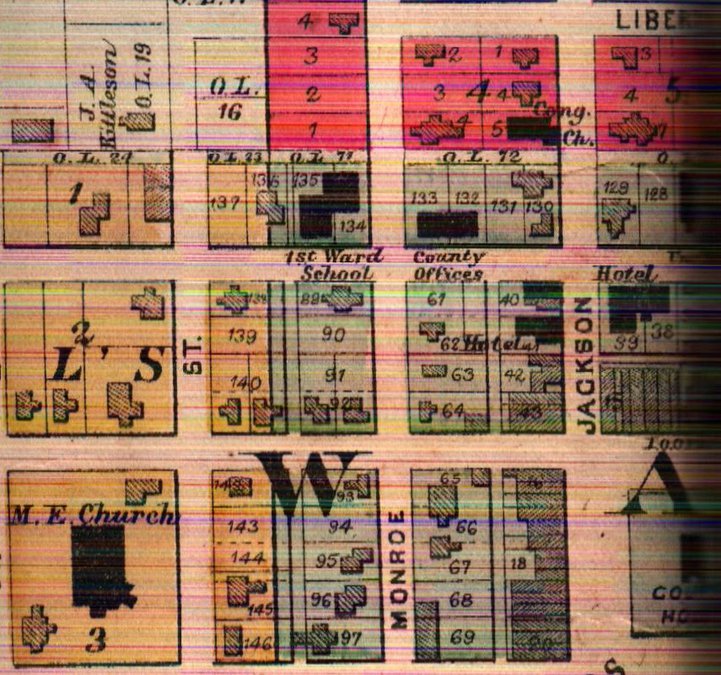Most people in Monroe probably know that the YMCA (Young Men’s Christian Association) building has stood at 1307 2nd Street for nearly four decades. The organization had its origin in London, England in the 1840s. Many of you will probably be surprised to hear that the first reference I found to a local YMCA was in the Monroe Sentinel on May 18, 1870. It said, “Y. M. C. A. Union Prayer Meetings every sabbath at 9 o’clock A. M., at the Methodist Episcopal Church.” It is unknown for how long these meetings and the YMCA continued in Monroe.
It was announced in February 1887 that a YMCA was organized by the young men of the German Evangelical Church. Officers were president Rev. Mr. Roch, vice president Fred Trockenbrod, secretary E. G. Probst, treasurer Otto Tschudy, and librarian W. Miller. At that time a suitable room had been rented in Chenoweth’s Block (formerly Union Hall) and was to be fitted up “to invite all young men to come in the evenings for instructive, useful and moral pleasure, as they will find books, magazines, and papers to read, or an innocent game to occupy their time. There will be lectures from time to time, and all possible efforts will be made to enable young men to employ their evenings for their true and lasting benefit, spiritually and intellectually.” In this article, they also sought donations of a book, magazines, or a picture to “ornament the room.” They were thankful for the liberal monetary contributions that had already been received from local businessmen.
The room, located on the north side of the square above Frautschy & Zumbrunnen’s, was dedicated on Tuesday evening, March 8. The singing clubs and the men’s choir and mixed choir of the German church led by their able instructor, Mr. Probst, opened the exercises with a selection and sang several pieces during the evening. “Rev. Mr. Koch offered a prayer and addressed a good number of friends of the young society with an interesting and fervent sermon. Mr. F. Trukenbrod gave a declamation of a very fine, appropriate poem, and rendered it in a truly good style. Father Tschudy also gave a few words of encouragement and advice to the young men, admonishing them to be true to their purpose and to do their work faithful for the true benefit of the town, so as to make their room a blessing and a place of pleasure and instruction to all who may come.” The exercises were concluded with another prayer and song; the rooms were declared to be open every evening from 7:00 to 9:00.
The gentlemen Bolender, Booth, Brown, Davenport, and Randall had already presented some interesting books, pictures, and mottos; other friends had promised the same. Friends were also asked to support the young society with spiritual help.
It is unknown how long the men operated this room, but the YMCA was not listed with the other societies in the 1891 city directory. A reading room was again opened and dedicated in October 1894 with opening and closing prayers by Rev. Nuzum. Mayor John Luchsinger and former senator Clawson made the speeches of the evening. No location was given for where this reading room was located.
A district convention of the YMCA was held in Monroe from Friday evening, May 22, 1896 through Sunday evening. The paper indicated that the attendance was not as large as it had been at former conventions held here, but considerable interest was shown in the meetings that were held at various churches. This article concluded by saying, “A committee was appointed to look into the advisability of forming a young men’s organization of some kind for Monroe. The committee is composed of the pastors of the churches, together with Messrs. L. Stevenson, W. S. Logan, E. S. Hanson, Louis Rood, and Bert Bridge.”
An editorial in the February 28, 1900 Monroe Sentinel had the headline “Why Not a Y.M.C.A.” It went on to say that Rev. Bethel’s pleas for a YMCA in this city came at an opportune time. “Monroe needs nothing at present, quite as much as a good, live and well-established YMCA. There are any number of young men in this city, who find time hanging on their hands when night comes. They want to get out; they want some place to go to — to mingle with other young men — and exchange notes and swap stories, experiences, or play a game of billiards or pool. And they go out, but to the wrong place. The YMCA would do away with a good deal of the damaging influence on the young men from saloon association, and at the same time substitute for questionable pleasures something good — something that is actually beneficial for the mind as well as the body. The idea is entirely feasible. It can be done. We move that Rev. Bethel act as chairman of the committee on organization, choose a dozen or fifty helpers, and get to work. It would be a lasting benefit to Monroe and to Monroe’s young men.”
It would be more than four years until a YMCA would be formed in Monroe. I’ll share more next week about the first incorporation of the organization and what happened for a few years after that.
— Matt Figi is a Monroe resident and a local historian. His column will appear periodically on Saturdays in the Times. He can be reached at mfigi48@tds.net or at 608-325-6503.






